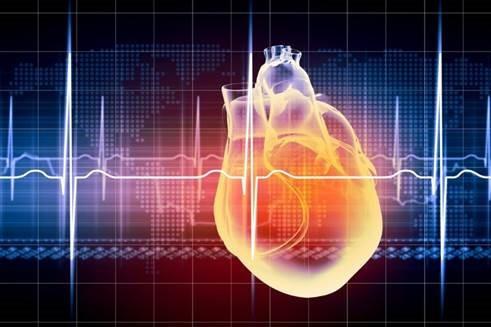A client recently reported to me that he suffers from atrial fibrillation (aka “A-fib”) and I asked him what he’s doing about it.
He said, “Well, there’s really not much I can do besides take my medications, right?”
WRONG!
Here is what I told him about Afib and ways you can help counteract its harmful effects if you’ve got it.
Afib—not a lie
Atrial fibrillation (Afib) is a condition characterized by an irregular and often rapid heart rate that can ultimately increase your risk of stroke, heart failure, and other complications.
Your heart is “out of rhythm” with Afib—the upper chambers (the atria) beat erratically and out of sync with the lower ones (the ventricles).
Although many people have no symptoms and don’t even know they have Afib until it shows up on an EKG or similar test, others suffer undeniable symptoms including:
- Palpitations
- Weakness
- Reduced ability to exercise
- Fatigue
- Lightheadedness
- Dizziness
- Confusion
- Shortness of breath
- Chest pain
How you can help
Although most people with Afib go on to lead perfectly normal lives, since there is potential for serious cardiovascular problems, it’s crucial to do all you can to counteract any underlying issues and risk factors.
Here are some ways you can help:
Lose weight if you need to
Being overweight increases your risk of just about every disease, Afib included. Don’t go for the gimmicks—the tried and true formula for weight loss is a healthy diet and regular exercise (with your doctor’s OK, of course). Make your meals predominantly proteins and veggies and avoid the starchy carbs and sugars. Aim to exercise at least 3-4 times a week.
Reduce inflammation
 Inflammation is a factor behind countless diseases, especially cardiovascular conditions. A healthy diet featuring a variety of antioxidant-rich fresh fruits and vegetables is step one. Also, consider supplementing with Nature’s perfect anti-inflammatory--omega-3 fatty acids—as well as vitamin D. VitalMega-3 fish oil formula and Optimum DK Formula with FruiteX-B®, can help fill this important need and fight to keep inflammation low in your tissues and blood vessels.
Inflammation is a factor behind countless diseases, especially cardiovascular conditions. A healthy diet featuring a variety of antioxidant-rich fresh fruits and vegetables is step one. Also, consider supplementing with Nature’s perfect anti-inflammatory--omega-3 fatty acids—as well as vitamin D. VitalMega-3 fish oil formula and Optimum DK Formula with FruiteX-B®, can help fill this important need and fight to keep inflammation low in your tissues and blood vessels.
(Note: Be sure to talk to your doctor first if you are taking blood thinners or other medications.)
Reduce stress
Stress can trigger inflammation and worsen heart rhythm conditions, plus it can also cause weight gain—making it a triple whammy for people with Afib. Do whatever you need to do—deep breathing, massage, prayer, essential oils like lavender, therapy, adopting a pet and meditation can all help. Plus keep in mind that regular exercise is the #1 stress reducer in the world.
Consider acupuncture
Acupuncture can also help reduce stress and bring the body back into a healthy balance.
Get your thyroid tested
Thyroid disorders are an underlying factor behind many cases of Afib, as thyroid hormones control just about every process in your body.
Get 7-9 hours of sleep each night
Proper sleep is essential to keep stress low and for your body to maintain normal internal rhythms. If you have trouble sleeping, here are some ways to help:
- Avoid alcohol, sugar, and caffeine before bedtime (actually, most all the time!)
- Drink chamomile tea in the evening
- Consider L-tryptophan or melatonin supplements
- Take a warm bath or shower in the evening
- Avoid watching unsettling images on TV including suspenseful or violent movies or the news
- Get into a good routine—try to go to bed and get up at the same times each night and day
- Omega-3 essential fatty acids like VitalMega-3 are helpful with sleep too
- Regular exercise can help encourage better sleep—just make sure you are not exercising too close to bedtime or it may backfire on you and keep you awake!
To your health,
Sherry Brescia












@ Rose – Thank you for your feedback! We are so happy we were able to help.
@ Joy – I have notified customer service of your issue and they will be reaching out to you within business hours today. Thank you!
Thank You for this !! It helped me understand what I am going through!1 I also can tell my family what this is !!! (aFib) I did not know I had it !! I am 74 and just had shortness of breath and no energy!??? The dr. found the heart beating fast!! So now the Dr. can work with me on the issue!!
I ordered a Great taste no pain Receipe book on 18 January,to this date have had no communication,what so ever, Please tell me where my book is.
@ Max: Sherry Brescia here. I’m very sorry to hear you have had such challenges with Afib. However, I cannot find a basis for your statement that “90% of Afib sufferers have no symptoms and the other 10% have crippling symptoms.” According to the National Heart, Lung and Blood Institute, US Department of Health and Human Services, “Sometimes AF doesn’t cause signs or symptoms”—that hardly sounds like 90% of all people who have the condition. Additionally, there is no evidence supporting that for the alleged other 10% of Afib sufferers who DO have symptoms, those symptoms are “crippling” as you have stated. Symptoms are many times controlled with proper medical intervention. Additionally, I strongly disagree with your contention that I have somehow been “irresponsible” and have lead people to believe that diet, exercise and supplements will prevent Afib. Nowhere did I state that in this article. I merely stressed that it is important for people to do their part to counteract any underlying Afib issues and risk factors.